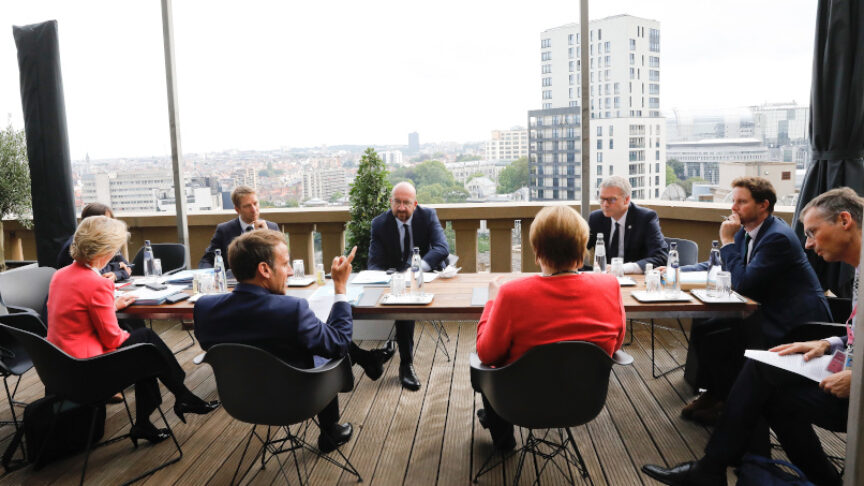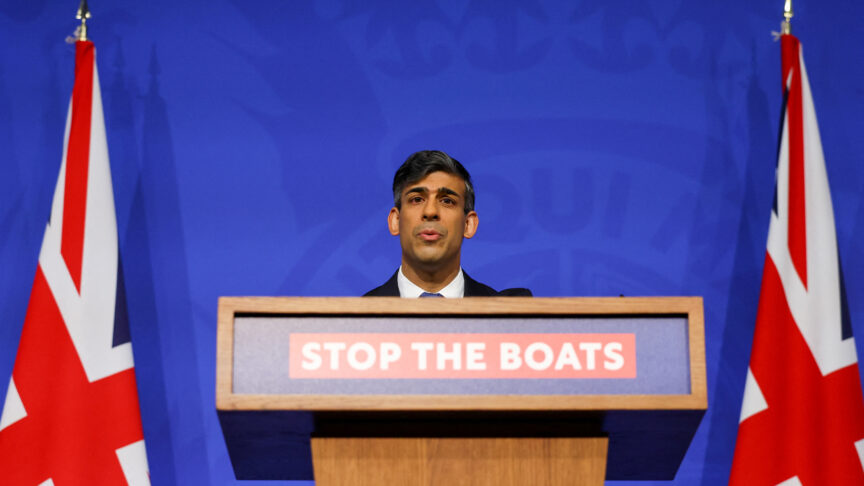Why Europe needs a recovery plan for strategic autonomy
Just as they have on the economic recovery, Berlin and Paris must overcome their differences and present a courageous plan to create a Europe that takes decisive geopolitical action.
It was not a picture for the history books: when German Chancellor Angela Merkel and French President Emmanuel Macron presented their plan for the European Union’s economic recovery from the coronavirus crisis via video conference on 19 May, they were unable to hold hands with each other as Helmut Kohl and François Mitterrand had done at Verdun. The event was pragmatic and even seemed a little technocratic.
But the act itself was historic. Admittedly, in Verdun in 1984, Mitterrand and Kohl were concerned with Franco-German reconciliation after centuries of war. Today, it is “only” about Franco-German cooperation in Europe after years of stagnation. But after the famous Franco-German engine came close to being sent in for a tune-up – or even to the scrapyard – Macron and Merkel have finally completed a great joint effort that paved the ground for the EU’s agreement on a joint recovery plan. This agreement is a major step forward for European domestic policy. The Franco-German engine is running at full speed. An equally ambitious effort is now needed in European foreign policy.
The coronavirus has not only killed 190,000 Europeans – while disrupting the daily lives and economic security of millions – but has also made Europe’s foreign policy challenges more urgent. Since the crisis began, the Chinese government has used mask diplomacy and disinformation to expand its influence in Europe in a targeted manner. It is likely that the US President Donald Trump, who has come under pressure as a result of his administration’s disastrous management of the pandemic, will step up his campaign against the EU. His announcement of a massive withdrawal of US troops from Germany suggests that the American commitment to defending European security is becoming increasingly questionable. Russia under President Vladimir Putin remains a challenge.
In this situation, it is fundamentally important to strengthen the EU internally – but this alone will not be enough for the bloc to assert itself internationally. Just as they have on the economic recovery, Berlin and Paris must overcome their differences and present a courageous plan to create a Europe that takes decisive action in foreign and security policy matters.
Both Macron and Merkel have often talked about the fact that Europeans must play a greater role on the global stage if they want to avoid being torn apart by great power competition. The same tune is sung in Brussels – after all, it was President Ursula von der Leyen who set out to establish a “geopolitical Commission”. But, without Berlin and Paris pulling in the same direction in foreign and security policy, nothing can come of this idea. Macron’s recent charm offensive on Russia and his comments on the alleged brain death of NATO did not go down well in Berlin. The Germans have little sympathy for Macron’s disruptive political style. At the same time, the French president has in recent times been visibly annoyed by Germany’s sluggishness and its lack of awareness of the urgent need to strategically reorient EU foreign and security policy.
The differences between France and Germany are particularly apparent on European defence. It seems that Berlin and Paris live on different planets when it comes to defence issues, as the European Council on Foreign Relations’ EU Coalition Explorer shows. While defence is at the top of the list of political priorities for the next five years in France, it is only ranked in 14th place in Germany.
The EU cannot afford such disagreement. According to the EU Coalition Explorer, Germany and France both have so much influence within the EU that, if they do not work together, they will block each other. The example of the Franco-German proposal for a joint recovery fund shows that Berlin and Paris can overcome their differences through political will. In European defence, they need to do so with special urgency. If there is no rapprochement between them, Europe will never be able to act more effectively.
Berlin must heed the deep frustration with Germany’s actions and attitude expressed by French decision-makers and foreign policy experts.
Berlin’s support for common European debt and the Franco-German agreement on the recovery fund have temporarily lifted the mood in Paris. However, Berlin must heed the deep frustration with Germany’s actions and attitude expressed by French decision-makers and foreign policy experts. When asked which of up to five countries have disappointed their government the most in the past two years, more than half of French respondents named Germany. This means that the French are more disappointed with Germany than with Poland or Hungary – countries that appear to be gradually abandoning the rule of law.
In this respect, a common vision for European defence policy would kill two birds with one stone: it would strengthen Europe politically and prepare it for a turbulent era of great power competition. And it would restore Europeans’ confidence in the Franco-German engine, as well as France’s confidence in Germany. Such an agreement would certainly make it into the history books – perhaps sealed with another iconic handshake.
The European Council on Foreign Relations does not take collective positions. ECFR publications only represent the views of their individual authors.



